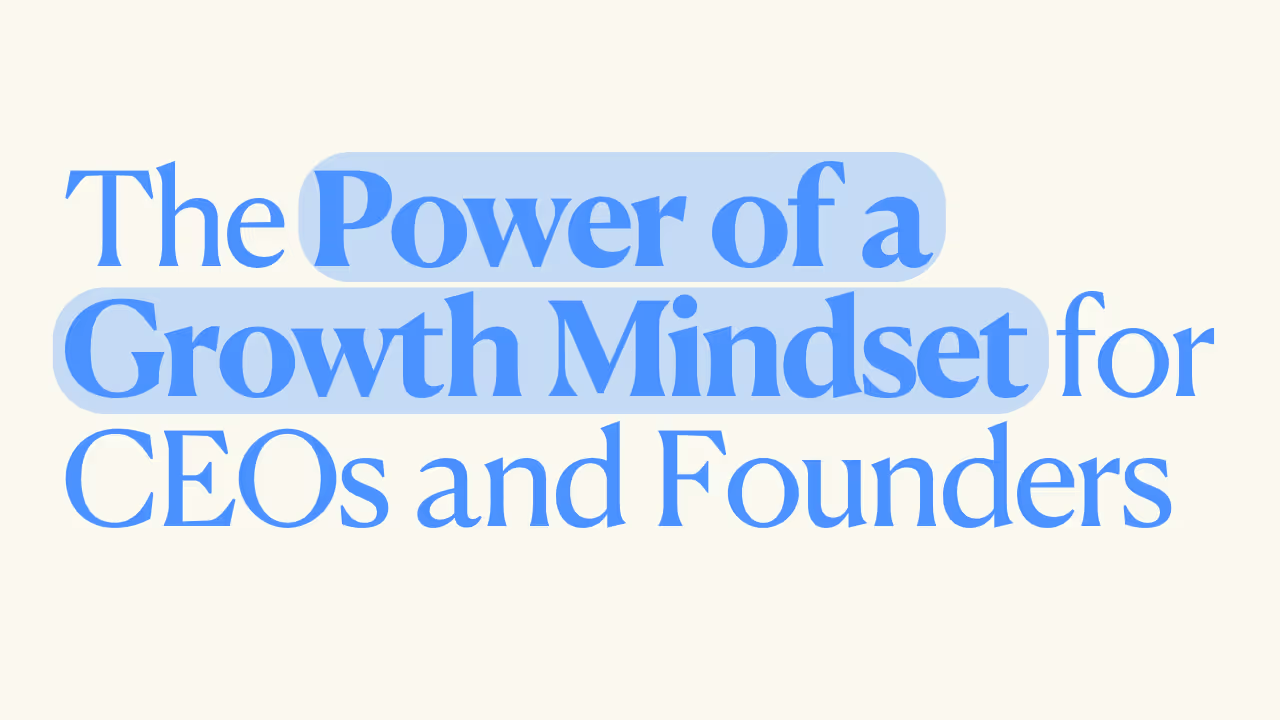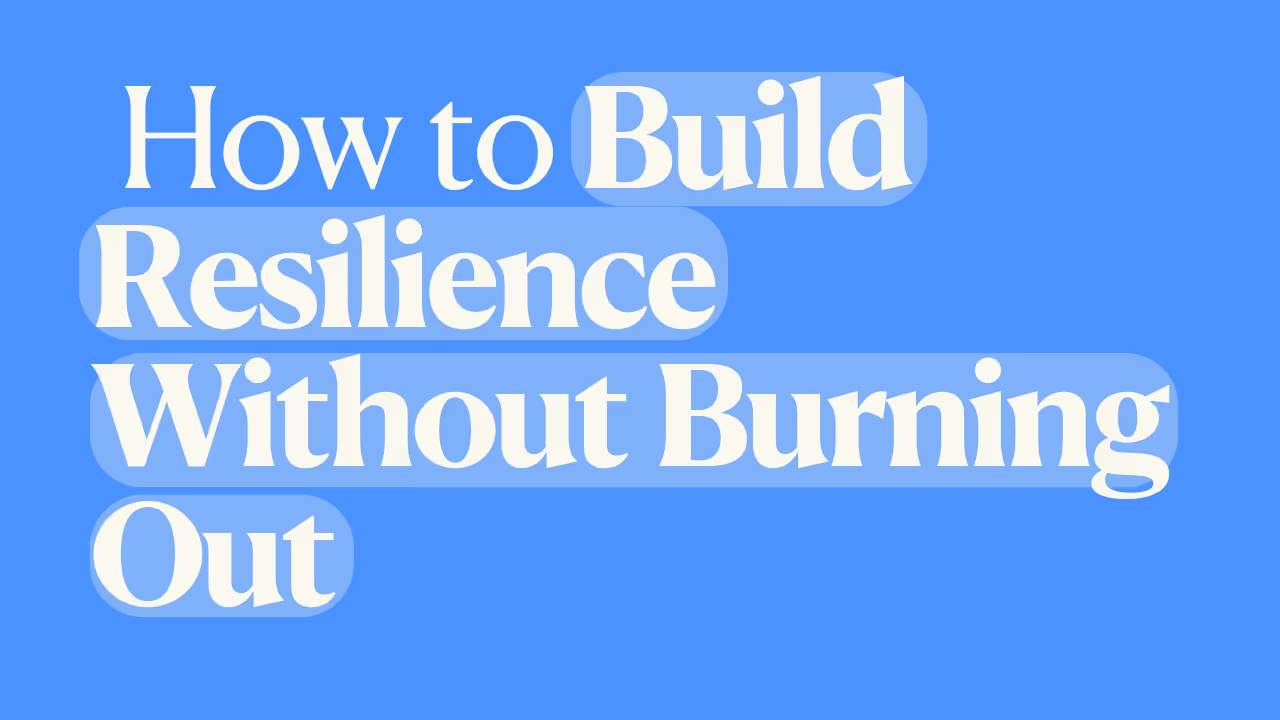The Power of a Growth Mindset for CEOs and Founders
In today's fast-paced and ever-evolving business landscape, CEOs and founders are constantly faced with new challenges and opportunities. The ability to adapt, learn, and grow is essential for success in this dynamic environment. This is where the power of a growth mindset comes into play.
Understanding the Concept of a Growth Mindset
At its core, a growth mindset is the belief that abilities and intelligence can be developed through dedication, effort, and a willingness to learn from failures and setbacks. It is a mindset that embraces challenges, persists in the face of obstacles, and sees failure not as a permanent setback, but as an opportunity for growth and improvement.
Individuals with a growth mindset understand that their talents and skills are not fixed traits but can be cultivated and enhanced over time. This mindset fosters a love for learning and a resilience that enables them to bounce back from setbacks stronger than before. By embracing challenges and seeking out opportunities for growth, those with a growth mindset are able to reach new heights of achievement and success.
The Definition of a Growth Mindset
A growth mindset is characterized by a belief that one's talents and abilities can be developed with practice, learning, and mentorship. It is a mindset that thrives on challenges and views setbacks as stepping stones towards success. With a growth mindset, CEOs and founders are more likely to take risks, seek out feedback, and continuously push their personal and professional boundaries.
Individuals who embody a growth mindset are not afraid to step out of their comfort zones and confront their limitations. They understand that true growth comes from pushing past obstacles and embracing the discomfort that comes with learning and development. By adopting a growth mindset, individuals can unlock their full potential and achieve remarkable feats that were once thought to be beyond their reach.
The Contrast Between Fixed and Growth Mindsets
On the other hand, a fixed mindset is the belief that intelligence and abilities are innate and cannot be changed or improved upon. Those with a fixed mindset tend to avoid challenges, fear failure, and are resistant to feedback. This can limit their potential for growth and hinder their ability to adapt to new situations and learn from mistakes.
Individuals with a fixed mindset may find themselves stuck in a cycle of self-doubt and avoidance, unwilling to take risks or explore new opportunities for fear of failure. This mindset can be constraining and prevent individuals from reaching their full potential, as they are less likely to embrace change and innovation. Recognizing the limitations of a fixed mindset is the first step towards cultivating a growth mindset and unlocking a world of possibilities for personal and professional development.
The Importance of a Growth Mindset for Leaders
CEOs and founders play a crucial role in shaping the direction and success of their organizations. Their mindset and attitudes towards growth have a direct impact on the culture, innovation, and overall performance of the company.
Having a growth mindset as a leader is not just about personal development; it also influences the entire organizational ecosystem. When leaders embody a growth mindset, they set the tone for the company's culture, encouraging continuous learning, resilience, and adaptability among employees. This, in turn, fosters a dynamic and forward-thinking environment where individuals are more motivated to push boundaries and explore new possibilities.
How a Growth Mindset Influences Decision-Making
Leaders with a growth mindset approach decision-making with an open mind and a willingness to consider multiple perspectives. They are not afraid to challenge the status quo and are open to new ideas and approaches. This flexibility allows them to make more informed decisions and adapt to changing market conditions.
Moreover, a growth mindset enables leaders to view setbacks and failures as opportunities for growth rather than insurmountable obstacles. This perspective empowers them to make decisions based on long-term goals and strategic vision, rather than short-term gains, leading to more sustainable and impactful outcomes for the organization.
The Role of a Growth Mindset in Innovation
Innovation is a key driver of growth and success in today's business world. Leaders with a growth mindset are more likely to foster a culture of innovation within their organizations. They encourage experimentation, embrace failure as a learning opportunity, and empower their teams to think creatively and take risks. This mindset creates an environment where new ideas can thrive and innovative solutions can be developed.
Furthermore, leaders with a growth mindset understand that innovation is not just about groundbreaking products or services; it also involves continuous improvement and evolution across all aspects of the business. By instilling a culture of innovation fueled by a growth mindset, leaders can position their organizations as industry pioneers, constantly adapting to meet the changing needs and demands of their customers and the market.
Cultivating a Growth Mindset in Business
While some individuals naturally possess a growth mindset, cultivating and nurturing this mindset is crucial for CEOs and founders to realize its full potential within their organizations.
Developing a growth mindset is not just a personal journey; it can also transform the entire culture of a business. When leaders prioritize continuous learning and improvement, it sets a powerful example for employees at all levels. This culture of growth can lead to increased innovation, resilience in the face of challenges, and a more collaborative work environment where feedback is embraced as a tool for growth.
Strategies for Developing a Growth Mindset
Cultivating a growth mindset starts with self-awareness and a commitment to personal development. CEOs and founders can encourage their own growth mindset by seeking out new challenges, learning from failures, and seeking feedback from mentors and colleagues. By setting a personal example, they can inspire and motivate their teams to adopt a growth mindset as well.
Furthermore, fostering a growth mindset involves creating a learning culture within the organization. This can be achieved through regular training programs, workshops on resilience and adaptability, and promoting a mindset of curiosity and exploration. Encouraging employees to take on stretch assignments and providing opportunities for cross-functional collaboration can also help embed a growth mindset into the fabric of the company.
Overcoming Challenges in Adopting a Growth Mindset
Adopting a growth mindset can be challenging, especially for those who have spent years with a fixed mindset. It requires a shift in perspective and a willingness to step out of one's comfort zone. CEOs and founders can support their teams in this transition by providing training and resources, creating a safe environment for taking risks, and recognizing and celebrating growth and learning.
Moreover, it's essential to address any organizational barriers that may hinder the development of a growth mindset. This could involve restructuring performance evaluations to focus on progress and effort rather than just outcomes, promoting psychological safety where employees feel comfortable sharing their ideas and failures, and fostering a culture that values resilience and perseverance as much as success.
The Impact of a Growth Mindset on Organizational Culture
Organizational culture plays a critical role in the success of a company. A growth mindset can have a profound impact on the culture within an organization, influencing how people interact, approach challenges, and view failure.
When individuals within an organization embrace a growth mindset, they are more likely to see obstacles as opportunities for learning and development. This shift in perspective can lead to increased creativity and a willingness to experiment with new ideas and approaches. Employees are encouraged to seek feedback, continuously improve, and push beyond their comfort zones, ultimately driving innovation and progress.
Fostering a Growth Mindset Culture in the Workplace
CEOs and founders can foster a growth mindset culture by encouraging collaboration, promoting continuous learning, and recognizing and rewarding effort and progress. By creating an environment that values growth and development, they can attract and retain top talent and create a positive and productive workplace.
Moreover, fostering a growth mindset culture requires leaders to lead by example. When employees see their superiors embracing challenges, seeking feedback, and displaying resilience in the face of setbacks, they are more likely to adopt similar attitudes and behaviors. This cascading effect can create a ripple of positivity throughout the organization, reinforcing the importance of a growth-oriented mindset at all levels.
The Long-Term Benefits of a Growth-Oriented Culture
A growth-oriented culture can lead to improved employee engagement, increased innovation, and enhanced problem-solving abilities within the organization. It can also foster a sense of trust and psychological safety, allowing employees to take risks and learn from their mistakes without fear of retribution. This creates a more resilient and agile organization that is better equipped to navigate the challenges of a rapidly changing business landscape.
Furthermore, a growth-oriented culture can have a lasting impact on employee morale and job satisfaction. When individuals feel supported in their professional growth and development, they are more likely to feel fulfilled in their roles and committed to the organization's mission. This sense of purpose and engagement can lead to higher levels of productivity, lower turnover rates, and a stronger sense of community within the workplace.
Growth Mindset and Personal Leadership Development
Developing a growth mindset is not only beneficial for the organization but also for the personal leadership development of CEOs and founders.
The Connection Between a Growth Mindset and Resilience
Resilience is an essential trait for leaders in today's challenging business environment. A growth mindset provides the foundation for resilience, as it enables leaders to view setbacks as learning opportunities and bounce back stronger from failures. By cultivating a growth mindset, CEOs and founders can strengthen their ability to navigate adversity and lead with confidence.
Growth Mindset as a Tool for Continuous Learning and Improvement
A growth mindset is synonymous with lifelong learning. CEOs and founders who embrace a growth mindset are constantly seeking new knowledge, refining their skills, and seeking feedback. This commitment to continuous learning not only enhances their personal leadership development but also sets a powerful example for their teams.
In conclusion, the power of a growth mindset for CEOs and founders cannot be understated. By embracing a growth mindset, leaders can unlock their full potential, drive innovation, and create a culture of continuous learning and improvement within their organizations. It is a mindset that empowers leaders to navigate uncertainty, overcome challenges, and adapt to changing circumstances. With a growth mindset, CEOs and founders can lead with resilience, foster a culture of innovation, and propel their organizations towards long-term success.


.png)

